Culture
The legally murky hobby of metal detecting in Nova Scotia
A Nova Scotia law that protects historic artifacts makes metal detecting illegal almost everywhere
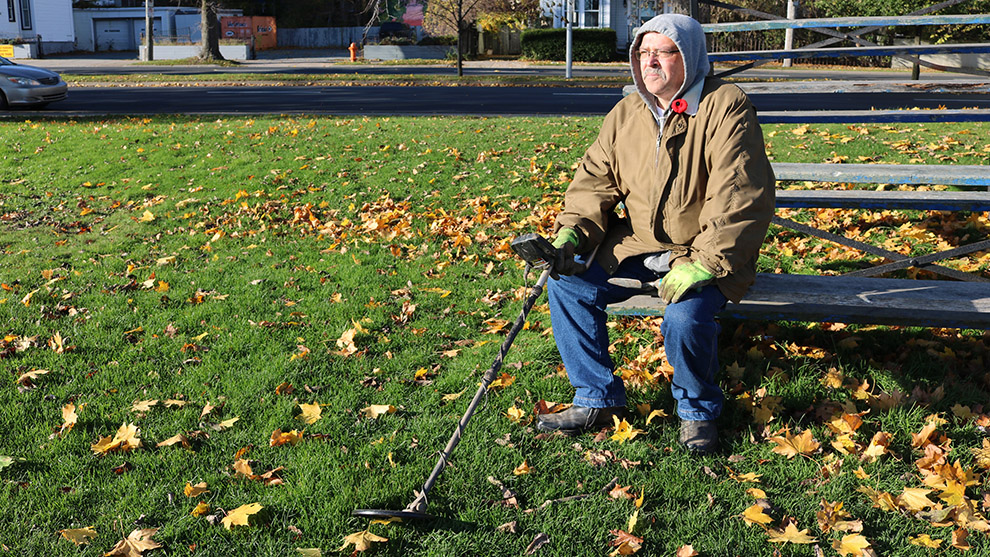
caption
Paul Knox at the Halifax Common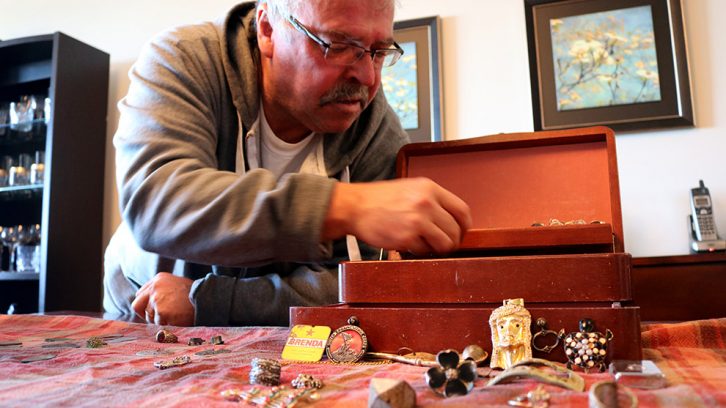
caption
Paul Knox displays his treasures at his Halifax home.Paul Knox gives a whole new meaning to the term “dirty money.”
Since March, armed with only a metal detector and a garden trowel, he’s dug up numerous silver rings, more than $730 worth of change and his share of bottle caps and pull tabs.
Each morning he spends two hours metal detecting at the Halifax Common or other public parks like it. Recently, Knox had his best day ever – $24 in two hours, which is better than minimum wage.
“It’s my hobby and I love doing it,” says Knox, who is semi-retired and has been metal detecting for four years.
While metal detecting Knox says he’s been told by passersby, park authorities – and even an archeologist – that metal detecting is illegal and puts historic sites and artifacts at risk.
“Until somebody gives me a ticket and I go to court, and it’s proven, I’ll continue to do it,” he says.
Under the Halifax Regional Municipal Topsoil By-Law, no one is supposed to “remove any topsoil from its natural location.” The fine is $250. There’s also a provincial law called the Special Places Protection Act, designed to protect Nova Scotia’s historic places and artifacts. The fine for breaking the law is a fine of up to $10,000.
The Special Places Protection Act doesn’t specifically mention metal detecting, but states anyone who intends to excavate historic objects must apply for a permit to ensure “that work is completed based on established standards by qualified applicants.”
According to the law, artifacts on private or public land, one inch or 10 feet below ground, above or below water, belong to the province of Nova Scotia. If found, people are legally required to report and hand that object to the province to be interpreted, cared for and potentially put in a museum.
Nevertheless, the province’s website says that metal detecting without a permit in Nova Scotia is legal. That is, if the person has no intention of finding historic objects or aren’t in an area the province considers to have archeological potential.
However, according to the province, anywhere can have archeological potential, which makes instances of legal metal detecting virtually non-existent.
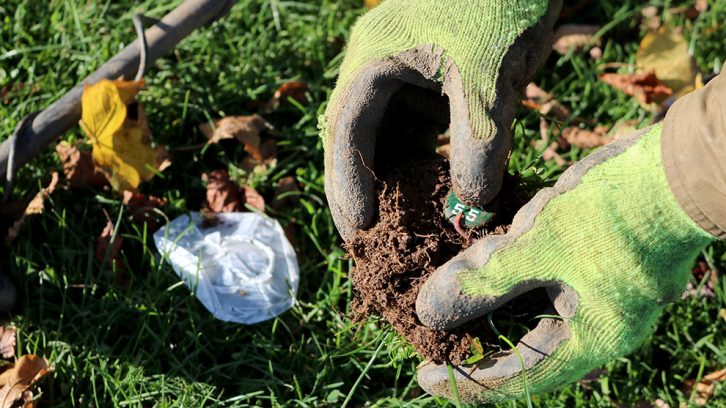
caption
Knox battles a worm to remove a bottle cap from a clump of dirt.More clarity ‘helpful for everybody’
“Some people who metal detect, some of them might not be aware of the legislation,” says Sean Weseloh-McKeane, co-ordinator of special places at Nova Scotia’s Department of Communities, Culture and Heritage. “But I know some of them likely are.”
Weseloh-McKeane regulates the Special Places Protection Act but doesn’t enforce it. His job is to ensure that Nova Scotia’s delicate, shared history is handled carefully and interpreted properly. He discourages metal detecting and has even approached metal detectorists to tell them the rules. If he thinks they’re breaking the law, he’ll call law enforcement.
“With those folks … that are specifically looking for items of historic interest or artifacts, then they generally are not bringing them into us,” says Weseloh-McKeane. “Because if they’re aware of the legislation, they’re also aware that what they’re doing, unless they have a research permit, it might be illegal.”
When metal detectorists find delicate artifacts, handle them poorly and keep them to themselves, potential archeological sites are put at risk. Weseloh-McKeane says that because of this, Nova Scotians lose part of their collective history.
“If you dig something up and take it home for your own private collection, it may give you some pleasure,” says Weseloh-McKeane.
“But we’re losing the information around that historical object because it wasn’t recovered under a proper archeological survey. We’re also losing those objects to be interpreted for more people than just that person who keeps it in their basement.”
Beaches, forests, parks and even the Common may all have archeological potential, so Waseloh-McKeane was hesitant to state a specific instance where metal detecting could be done legally.
Loose change and dropped items are fair game, says Weseloh-McKeane, but if an object with potential historical value is found, the province wants to see it.
This law is in place to protect historic artifacts, and doesn’t mean that every single item underground belongs to the province. Weseloh-McKeane is well aware of the nuances and complexities that come along with regulating the Act and says that “more clarity around metal detecting would be helpful for everybody.”
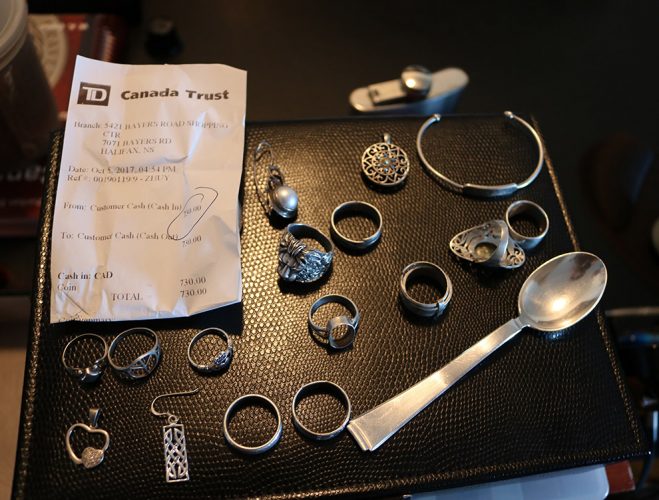
caption
A sample of Knox’s silver collection, along with a receipt from when he last deposited his coins.Up for review
What that clarity will look like, however, is yet to be determined. According to Nova Scotia’s 2017 Culture Action Plan, the Special Places Protection Act is up for review sometime next year.
Jonathan Fowler, associate professor of archeology at Saint Mary’s University, has been practicing archeology in Nova Scotia since the early 1990s. Fowler says the Special Places Protection Act “has its limitations and its shortcomings, but it’s better than nothing.”
He sees this review process as an opportunity to “build a bridge” between the province, metal detectorists, archeologists and Indigenous communities to better preserve the province’s history in a way that satisfies everyone.
Fowler pointed to jurisdictions like England and Wales, who have government funded liaisons who work with metal detectorists and the British museum to find and interpret artifacts.
He acknowledges that Nova Scotia has its own challenges, especially when it comes to incorporating Indigenous rights into the process, but says that many metal detectorists and archeologists share a common passion for history, exploration and the outdoors.
“The difference is that those of us who are doing this as part of the regulatory process, are doing it with an eye to the community’s interest,” says Fowler. “And too often, those who do this privately often they don’t realize how destructive their actions are or they don’t care.”
Common ground, common history
There is no concrete data that shows how pervasive metal detecting is in Nova Scotia because much of it happens in private and remote places.
Nevertheless, it has been a problem for archeologists in Atlantic Canada in the past. An example of this is in 2009, when the Beaubassin National Historic Site on the border of New Brunswick and Nova Scotia was looted by metal detectorists.
When Fowler works on an archeological site he doesn’t publicly disclose the location to prevent looting. Sites he has worked on, however, have been impacted by metal detectorists who got there before him.
Knox is loosely aware of the rules around metal detecting. He says he would never metal detect in special places like Citadel Hill or Louisbourg. But to him, “public land is public land,” and he says he has the right to keep the things he finds there. These include historic coins, he says, but if he found something that he thought was truly special he would take it to a museum.
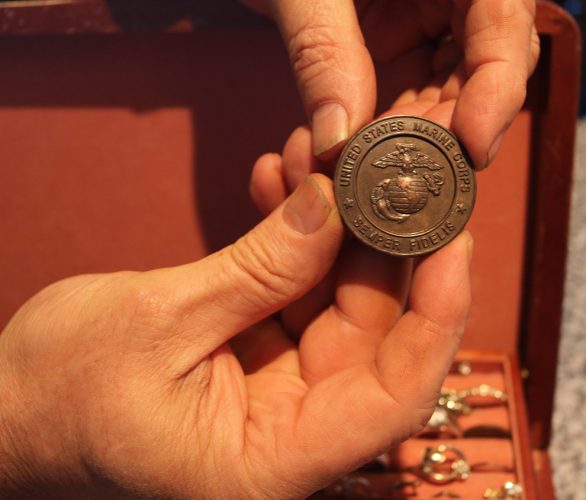
caption
Knox shows a medallion he found while metal detecting.Every morning, when Knox goes to places like the Halifax Common to metal detect he digs his holes and fills them up to allow the grass to grow back. When he finds a pull tab or a bottle cap he puts it in a special pouch and disposes of it later.
Fowler, as an archeologist, takes no issue with people who are just looking for spare change, but says that historical objects could still potentially be found just a few inches below places like the Common.
“Common land or not, it belongs to all of us,” says Fowler. “If it is information about our past, the principle is: our past is collectively ours.”
Video shot and edited by Silas Brown

C
Chris
M
Max
M
Merryl Bustin
A
Anton Priest
B
Bruce D Campbell